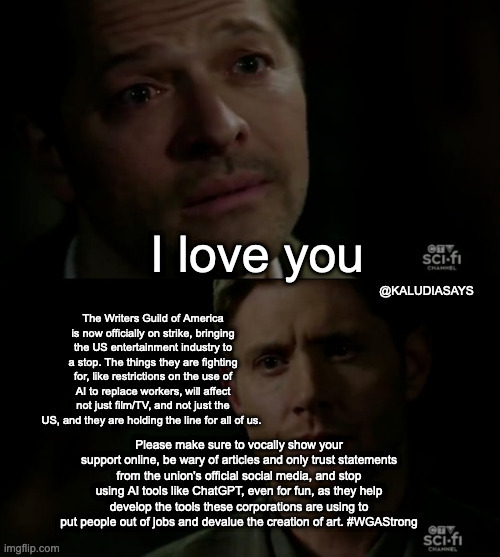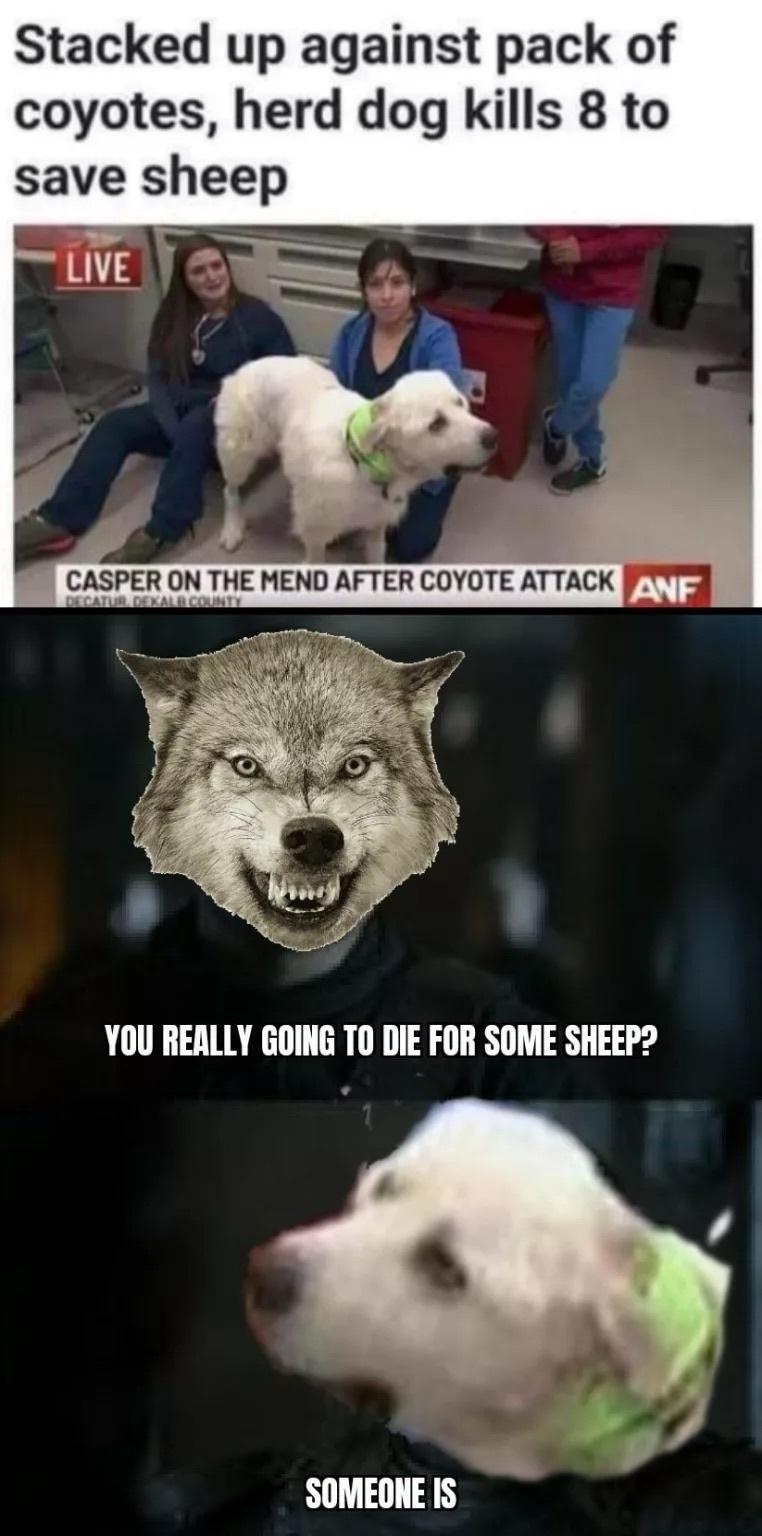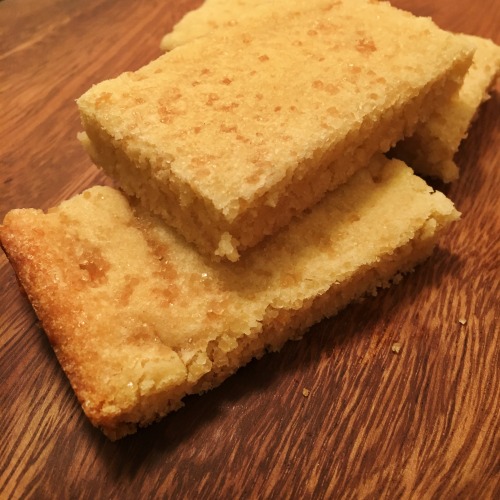For More Information And To Support The WGA Please:

For more information and to support the WGA please:
Follow their official social media on all platforms and only trust statements from the union itself, and articles they promote (be wary of other articles).
Read up on the issues being fought for (there are articles supported by the union in their linktree)
Be vocal in your support and inform others in your communities.
Stop using ChatGPT and other AI tools, even for fun.
More Posts from Cardinalfandom and Others

On a scale...
from Saoirse Ronan

to Saoirse Ronan

How successful were you in drowning your sister?

“When we grab you by the ankles Where our mark is to be made you’ll soon be doing noble work Although you won’t be paid When we drive away in secret You’ll be a volunteer So don’t scream where we take you; The world is quiet here.”
Oh yes, that period piece about a gay couple with an age-gap living near the water




Remember this girl? This is her now, feel old yet?
WEBSITES FOR WRITERS {masterpost}
E.A. Deverell - FREE worksheets (characters, world building, narrator, etc.) and paid courses;
Hiveword - Helps to research any topic to write about (has other resources, too);
BetaBooks - Share your draft with your beta reader (can be more than one), and see where they stopped reading, their comments, etc.;
Charlotte Dillon - Research links;
Writing realistic injuries - The title is pretty self-explanatory: while writing about an injury, take a look at this useful website;
One Stop for Writers - You guys... this website has literally everything we need: a) Description thesaurus collection, b) Character builder, c) Story maps, d) Scene maps & timelines, e) World building surveys, f) Worksheets, f) Tutorials, and much more! Although it has a paid plan ($90/year | $50/6 months | $9/month), you can still get a 2-week FREE trial;
One Stop for Writers Roadmap - It has many tips for you, divided into three different topics: a) How to plan a story, b) How to write a story, c) How to revise a story. The best thing about this? It's FREE!
Story Structure Database - The Story Structure Database is an archive of books and movies, recording all their major plot points;
National Centre for Writing - FREE worksheets and writing courses. Has also paid courses;
Penguin Random House - Has some writing contests and great opportunities;
Crime Reads - Get inspired before writing a crime scene;
The Creative Academy for Writers - "Writers helping writers along every step of the path to publication." It's FREE and has ZOOM writing rooms;
Reedsy - "A trusted place to learn how to successfully publish your book" It has many tips, and tools (generators), contests, prompts lists, etc. FREE;
QueryTracker - Find agents for your books (personally, I've never used this before, but I thought I should feature it here);
Pacemaker - Track your goals (example: Write 50K words - then, everytime you write, you track the number of the words, and it will make a graphic for you with your progress). It's FREE but has a paid plan;
Save the Cat! - The blog of the most known storytelling method. You can find posts, sheets, a software (student discount - 70%), and other things;
I hope this is helpful for you!
(Also, check my blog if you want to!)
ooh you mentioned buying a folk horror anthology in the tags of that horror post, can i ask which one? i’d love to read more folk horror but i don’t really know where to start (also if you have other folk horror recs i would not be upset)
Yeah of course, happy to help! I bought The Fiends in the Furrows: An Anthology of Folk Horror edited by David T. Neal which features stories by current writers (and there's a second anthology with more).
If you're looking to start with some classic folk horror then there's a few major authors and stories that are worth checking out (many of these should be available to read online for free):
'The White People' by Arthur Machen
'The Lottery' by Shirley Jackson
'The Black Reaper' by Bernard Capes
'The Ash Tree' by M. R. James
'Pallinghurst Barrow' by Grant Allen
'The Willows' by Algernon Blackwood
Ritual by David Pinner (basis for The Wicker Man)
'The Music on the Hill' by Saki
The Great God Pan by Arthur Machen
'The Sin Eater' by Fiona MacLeod
Harvest Home by Thomas Tryon
'The Children of the Corn' by Stephen King
And if you want some recent folk horror then these are worth a go:
The Loney by Andrew Michael Hurley
The Owl Killers by Karen Maitland
The Daylight Gate by Jeanette Winterson
Ghost Wall by Sarah Moss
The Plague Stones by James Brogden
Through the Woods by Emily Carroll (graphic story collection)
The Ritual by Adam Nevill (honestly the film is much better and well worth watching, but the first half of the book is fantastic)
Wakenhyrst by Michelle Paver (gothic horror meets folk horror)
The Hidden People by Alison Littlewood
Dark Harvest by Norman Partridge
The Only Good Indians by Stephen Graham Jones (not a traditional folk horror novel but it explores the role of Native American folklore & culture in the modern day in a really interesting way)
The Reddening by Adam Nevill
Pine by Francine Toon
-
 rejected-void-dust reblogged this · 3 months ago
rejected-void-dust reblogged this · 3 months ago -
 obliquelyobscure liked this · 3 months ago
obliquelyobscure liked this · 3 months ago -
 phoenixpinks liked this · 3 months ago
phoenixpinks liked this · 3 months ago -
 desintalia reblogged this · 3 months ago
desintalia reblogged this · 3 months ago -
 desintalia liked this · 3 months ago
desintalia liked this · 3 months ago -
 comfortcloudsworld liked this · 3 months ago
comfortcloudsworld liked this · 3 months ago -
 ironicsmiles reblogged this · 3 months ago
ironicsmiles reblogged this · 3 months ago -
 ironicsmiles liked this · 3 months ago
ironicsmiles liked this · 3 months ago -
 riskybusinessart liked this · 4 months ago
riskybusinessart liked this · 4 months ago -
 ummmuhhidk liked this · 4 months ago
ummmuhhidk liked this · 4 months ago -
 imthatmystifiedbitch liked this · 4 months ago
imthatmystifiedbitch liked this · 4 months ago -
 remublack liked this · 4 months ago
remublack liked this · 4 months ago -
 xxp1v0xx liked this · 4 months ago
xxp1v0xx liked this · 4 months ago -
 ravvy5xg liked this · 4 months ago
ravvy5xg liked this · 4 months ago -
 themadauthorshatter liked this · 5 months ago
themadauthorshatter liked this · 5 months ago -
 h0ly-knight liked this · 5 months ago
h0ly-knight liked this · 5 months ago -
 popp1n reblogged this · 6 months ago
popp1n reblogged this · 6 months ago -
 popp1n liked this · 6 months ago
popp1n liked this · 6 months ago -
 splatter-8-song liked this · 6 months ago
splatter-8-song liked this · 6 months ago -
 not-so-local-lesbian liked this · 6 months ago
not-so-local-lesbian liked this · 6 months ago -
 deckedoutknight liked this · 7 months ago
deckedoutknight liked this · 7 months ago -
 alimpsonsnotdragonfable reblogged this · 7 months ago
alimpsonsnotdragonfable reblogged this · 7 months ago -
 welcometomytrashpileofrandomshit liked this · 7 months ago
welcometomytrashpileofrandomshit liked this · 7 months ago -
 pawnfawn reblogged this · 7 months ago
pawnfawn reblogged this · 7 months ago -
 dimitragiannoula reblogged this · 8 months ago
dimitragiannoula reblogged this · 8 months ago -
 gunelismayilova liked this · 8 months ago
gunelismayilova liked this · 8 months ago -
 andaspoonfulofangst-whoops reblogged this · 8 months ago
andaspoonfulofangst-whoops reblogged this · 8 months ago -
 letter-22 liked this · 8 months ago
letter-22 liked this · 8 months ago -
 inky-fwog liked this · 8 months ago
inky-fwog liked this · 8 months ago -
 superanonymouscarrots liked this · 9 months ago
superanonymouscarrots liked this · 9 months ago -
 hellcatsworld liked this · 9 months ago
hellcatsworld liked this · 9 months ago -
 invrsiongensis liked this · 9 months ago
invrsiongensis liked this · 9 months ago -
 invrsiongensis reblogged this · 9 months ago
invrsiongensis reblogged this · 9 months ago -
 nerdasaurus07 liked this · 9 months ago
nerdasaurus07 liked this · 9 months ago -
 volfendahl reblogged this · 9 months ago
volfendahl reblogged this · 9 months ago -
 ultimatenugget liked this · 9 months ago
ultimatenugget liked this · 9 months ago -
 ratswilleaturchildren liked this · 10 months ago
ratswilleaturchildren liked this · 10 months ago -
 tourmelion liked this · 10 months ago
tourmelion liked this · 10 months ago -
 cosmospicegender liked this · 10 months ago
cosmospicegender liked this · 10 months ago -
 capailluiscedove liked this · 10 months ago
capailluiscedove liked this · 10 months ago -
 doodleempireofsticks liked this · 10 months ago
doodleempireofsticks liked this · 10 months ago -
 monty-j liked this · 10 months ago
monty-j liked this · 10 months ago -
 hahaheart1 liked this · 11 months ago
hahaheart1 liked this · 11 months ago -
 irregularnotagoblin liked this · 11 months ago
irregularnotagoblin liked this · 11 months ago -
 beverytender reblogged this · 1 year ago
beverytender reblogged this · 1 year ago -
 chaosandtwo reblogged this · 1 year ago
chaosandtwo reblogged this · 1 year ago -
 chaosandtwo liked this · 1 year ago
chaosandtwo liked this · 1 year ago -
 ride-thedragon liked this · 1 year ago
ride-thedragon liked this · 1 year ago



